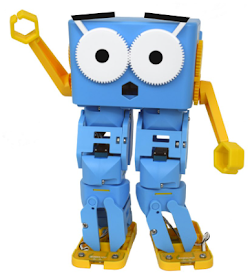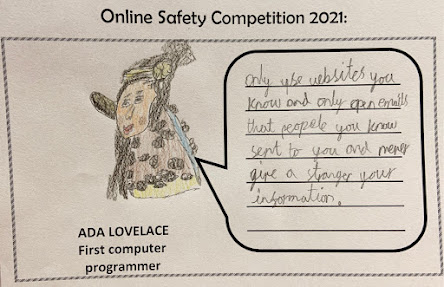Top 5 highlights from the LGfL Conference 2019
Yesterday I attended the
LGfL ‘Let’s Get Digital’ Conference. This is a great event which I have
attended almost every year that I have been an ICT/Computing Leader. The
conference is free for LGfL schools and consists of around 8 keynote speakers,
the choice to attend three 20 minute seminars in smaller rooms, a free lunch
and opportunities to visit pop up stands run by LGfL’s partners. These included
Busy Things, J2E, Avantis VR and Google. The venue had changed to a much larger
space in Liverpool Street meaning it was easier to network and find your way around!
So here are my top 5
highlights from the conference this year…
5) Don't run any more parent online safety workshops
photo: LGfL
I attended a seminar run
by LGfL Safeguarding Manager, Mark Bentley @LGfLDigiSafe , who said he’s been
asked a million times ‘How do I get parents to attend my parent online safety
workshop?’ – His answer in summary is ‘don’t do it! It’s much more effective to
drip feed online safety information through the year via a corner of the
newsletter, a text or digital board in the playground.’ This way, you are
getting the information to everyone, it’s not overloading them and if there are
immediate updates or overnight viral scare videos – then the advice can get to
everyone quicker.
This has prompted me from
Sept 19 to not hold any more parent workshops during the year but to create a
corner of our newsletter dedicated to online safety tips and updates and let
parents know I am available for more advise should they want more detail about
a particular issue.
4) The head teacher who
turned his school around
photo: @LGfL
I was amazed by the
journey presented to us by the last keynote speaker of the day, Chris Dyson
@chrisdysonHT, headteacher of Parklands Primary in Leeds. A school he described
when he took it on as being the most deprived school in Leeds. A string of
previous heads had come and gone, the school was at the bottom of the inadequate
rating and they had had to exclude over 100 children over a very short number
of years. It was incredible hearing his story of how he has turned this school
around through exceptional leadership and prioritising aspects like pupil and
staff well-being. It’s at the forefront of everything.
His journey has been
broadcast of various TV/news programmes and he continues to bring his children
new experiences like visiting Santa or visiting a beach by opening the school
of the day before Christmas Eve for local families or shutting the school for a
whole day while everything travels to the beach. Everything is funded through
donations or sponsorship. He said he has managed to raise over £300,000 from
businesses to go towards the children’s experience of school. They are Times
Tables whizzes right through from Year 1 to 6 and are regularly rewarded for
it. The school is now Outstanding and it is great to hear about this journey –
especially as one of Chris’ main focuses was well-being which is so important
in schools today but so often ignored. If the teachers aren’t happy, the pupils
won’t be and vice versa.
3) Networking & Meeting
followers
The more I attend LGFL
Conferences, the more I start to recognise familiar faces. It is a great
opportunity to talk to the LGFL team who are always happy to chat about
anything and to network with other leaders. I met up with Simon, a deputy head
and Apple Distinguished Educator from Anson Primary and Eleanor, a teacher and
Computing lead from Wembley Primary. Both of whom I knew from local Brent
courses I have attended. What was really fantastic though was meeting two of my
Eat Sleep ICT Repeat Facebook followers, Clare and Mandy, who I have chatted
with on comment posts and who interact regularly with my page. It was fantastic
to finally meet these two in real life and talk properly about our jobs and
ICT. I’m hoping I can meet more followers and people I follow at future
conferences which could lead to further opportunities for collaboration.
2) Unplugged programming lessons
One of the morning keynotes
was delivered by Julian S Wood @Ideas_Factory, a deputy head and master
computer teacher. Julian reminded me about the importance of teaching unplugged
programming lessons using ideas like flow charts, instructional games and
post-it note programming. It made me realise that for children to really
understand algorithms, they’ve got to understand instructions and sequences.
I
implemented Julian’s ideas the very next day with my first coding lesson with
Reception – right at the start of their programming journey! Perfect timing and
opportunity. I usually start this topic by getting them straight on the Beebots
or on Busy Things coding activities but this morning I turned every computer
and robot off and we talked about what an instruction is, what instructions do
teachers give you, what is a machine, how do you make a machine work, what’s the
difference between a machine and a table and how can we give accurate, clear
instructions.
The children then went off in pairs and gave their partner
instructions on how to brush their teeth, make a bowl of cereal and make a
cheese sandwich. The partner had to act it out to test whether the instructions
were accurate enough. I heard some children say things like, “How can I eat my
cereal, you haven’t told me to get a spoon!” This was great as it showed how
carefully they were following the instructions.
I then modelled
instructions for brushing teeth but missed out putting the toothpaste of the
brush. The children had to identify afterwards which instruction was missing.
This is so essential for understanding debugging and I can refer back to this
lesson when we start programming the Beebots next week. The children have a
firmer understanding of how and why the Beebot will move because we’ve given it
an instruction. And if we make a mistake I can refer to the toothpaste scenario
and get them to use their computational thinking skills to figure out what went
wrong and how they can fix it.
1) EduBlocks –
Transitioning from Block Coding to Python
The Number 1 spot has to
go to keynote speaker, Josh Lowe @all_about_code, who has invented software
that helps children and adults understand Python by using the more familiar
(Scratch) block coding layout and design. His software is a FREE resource
available on multi device platforms and is currently being used in over 120
countries. It is called EduBlocks @edu_blocks and has been around now for 4
years. The most incredible thing about Josh is he is 15 years old and created
EduBlocks when he was 11!!! I am blown away by this! He has recognised a huge
need in education to help people transition from block coding which is fairly
clear to use to python which is so much harder to process.
I am really excited
about exploring his website and seeing if I can learn to code in Python. Then I
can teach my Year 6’s how to use it. Currently, they learn Logo after block
coding but it would be amazing if some of my more talented coders can be
challenged on Python through Josh’s software. I spoke to Josh and his dad
afterwards and asked if he would come to my school to demo his product to my
children – the issue, his dad pointed out, is that he is still a child himself in
full time school! We left it as a maybe for the future…
I would love to get
Josh to visit Elsley not just to teach Year 6 how to code using python but to
be an inspirational role model to them. I want them to meet someone who came up
with this brilliant idea and brought it to life himself at the age that they
currently are. I don’t think they’ll quite believe it but hopefully see what
can be achieved even at 11 years old!
And that is my top 5
highlights from this year’s LGfL conference. I look forward to attending in
2020!
James Fraser
Eat Sleep ICT Repeat
Elsley Primary School











Comments
Post a Comment